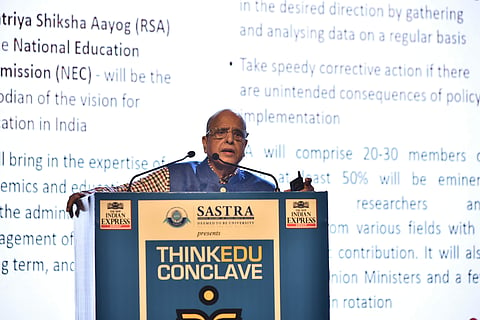

A recommendation has been made to categorise higher education institutions into research universities, teaching universities and autonomous degree-giving institutions, said National Education Policy (NEP) Drafting Committee Head and former ISRO Chairman Dr Kasturirangan in Bengaluru on Wednesday, May 11.
Speaking at a national conference on NEP — Decoding Contemporary Changes Affecting 21st Century Higher Education in India: In the Context of NEP 2020 — at St Joseph's College of Commerce, Dr Kasturirangan said that there needs to be a restructuring of higher education institutions as well as integration of teacher's education into higher education institutions, rather than having separate teachers' training institutes.
“We have around 40,000 higher education institutions, but they are fragmented and many are suboptimal, in terms of the number of students, teachers or infrastructure. Based on this, we have made a recommendation on restructuring institutes. This is to have three broad classes of higher education institutions — research universities, teaching universities and autonomous degree-giving institutions,” he said. Research-oriented universities will give equal importance to research and teaching while teaching universities would emphasise on teaching.
“All school teaching must be done by teachers who have had a stint in higher education institutions. Teachers must also have a holistic and multidisciplinary education, there’s no reason why teachers should not be trained and oriented in places where graduates study subjects like Engineering and Law,” he said.
Consideration is also being made for the type of technologies to be used in education. “We know that technology is going to have a role in the future of education. What kind of technologies, where they are applicable, the overall social, cultural and other implications of technology and how they impact a human being must be studied,” he said.
